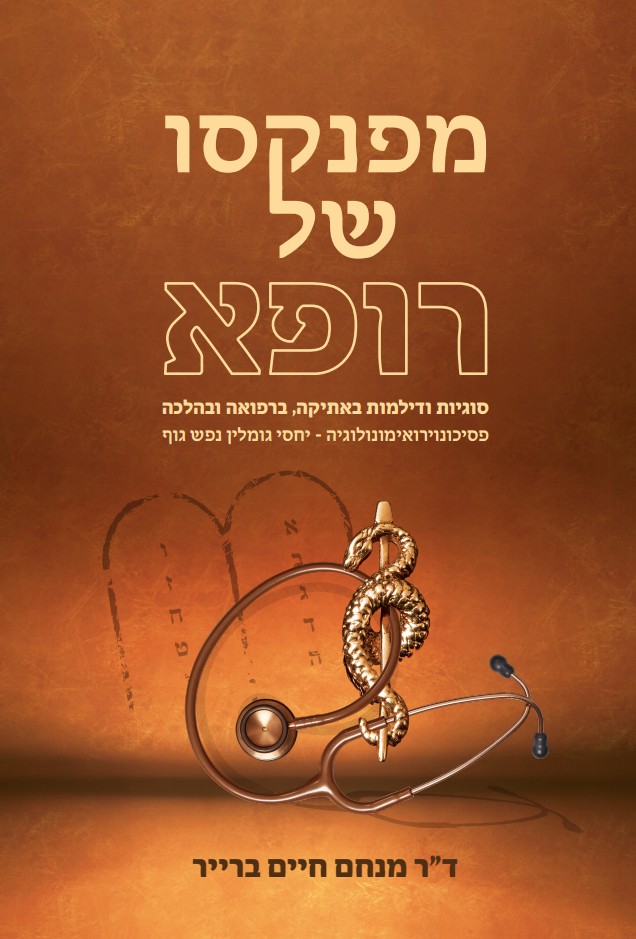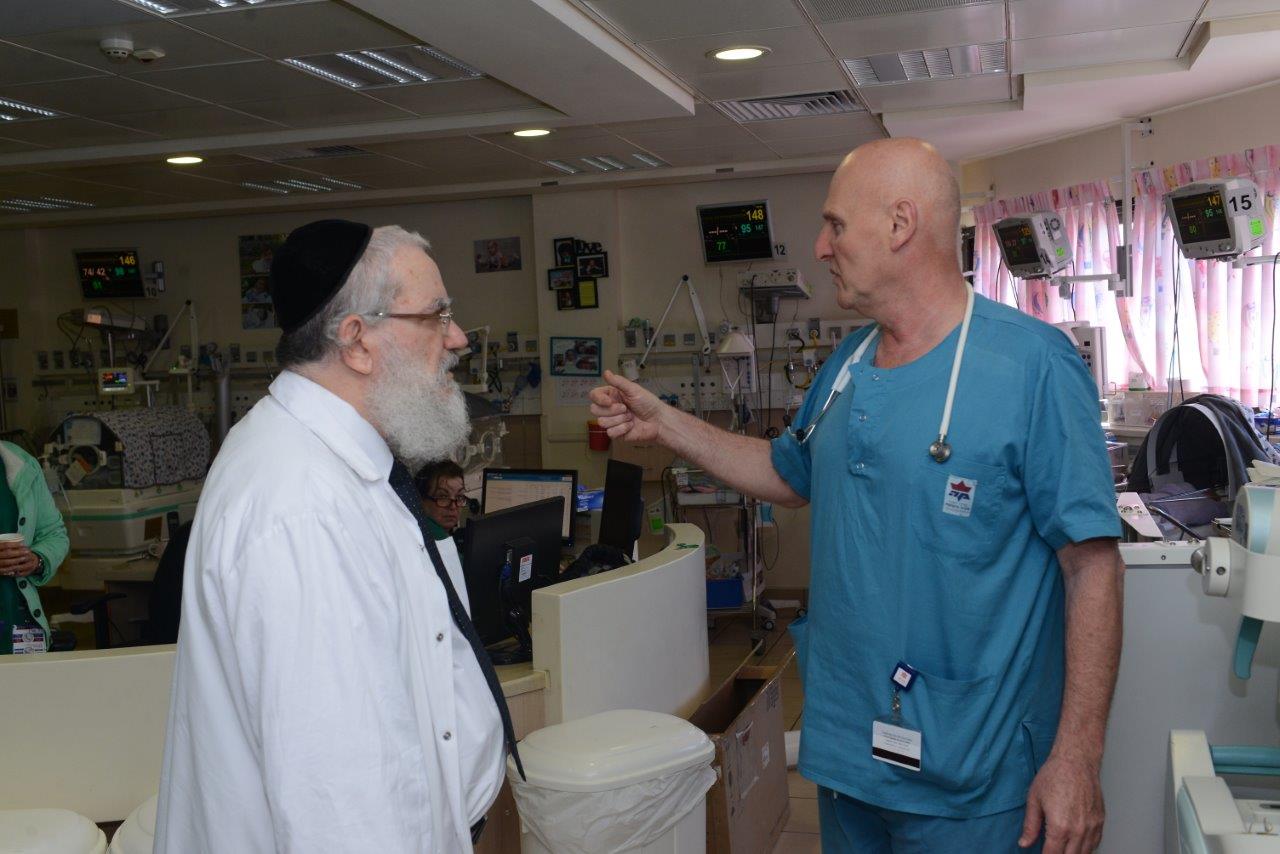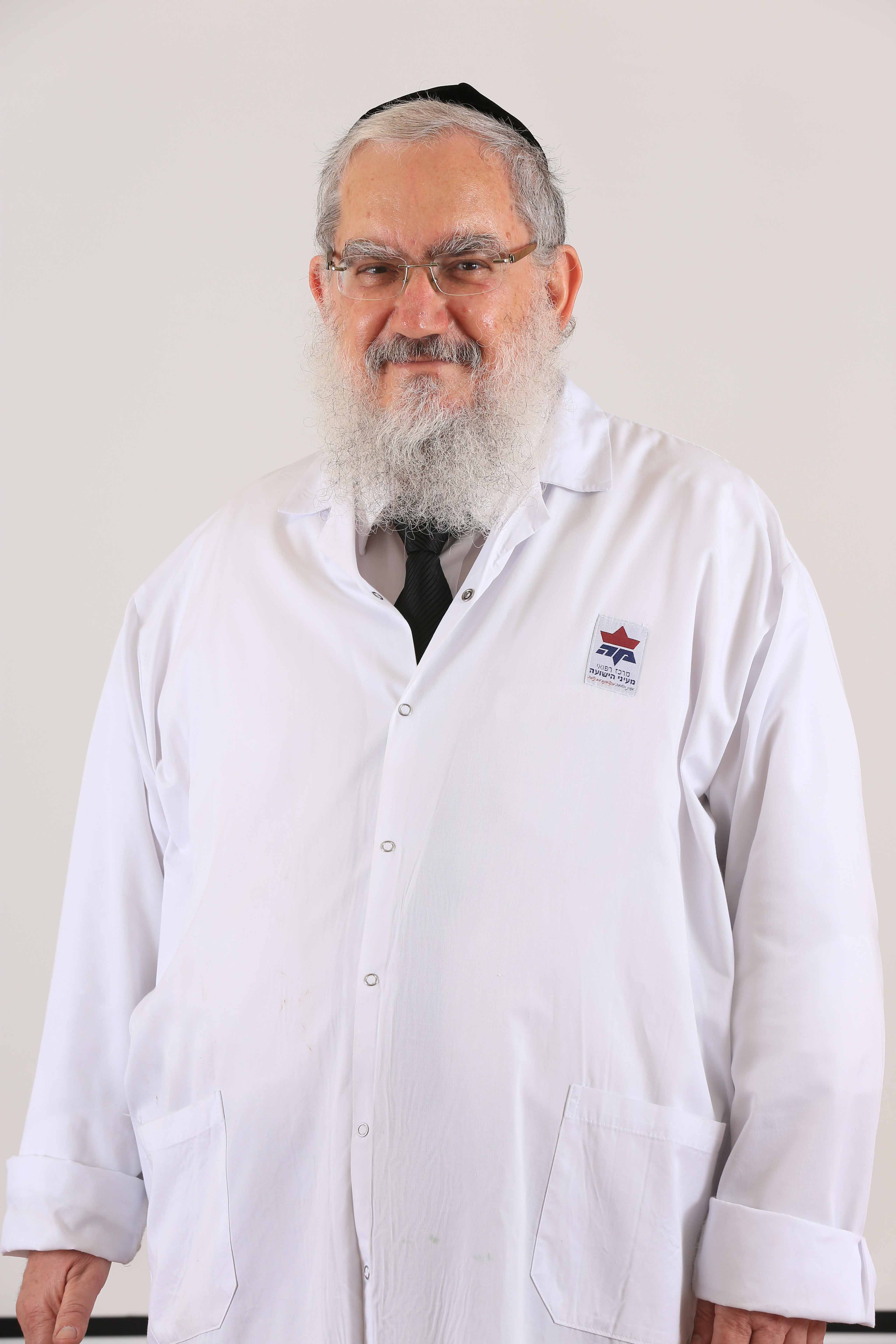Dr. Menachem Breyer: "The Rabbi Told Me: Your Soul's Mission is to Publish a Book on Medicine and Halacha"
Is it permissible to treat a patient in a way that increases their suffering if they wish for suffering as atonement? How is the confession performed when a dying patient is unconscious? What do prominent rabbis think about screening tests? These and many other questions are addressed in Dr. Menachem Chaim Breyer's new book, 'From a Doctor's Notebook.' A special interview.
 Dr. Menachem Chaim Breyer
Dr. Menachem Chaim BreyerOne day, while in his office at the Ma'ayanei HaYeshua Medical Center, Dr. Menachem Chaim Breyer, Deputy Medical Director and responsible for ethics and the sanctity of life at the hospital, was urgently called by a senior physician on the team. "I have never encountered such a dilemma!" the doctor informed him. "You must come immediately."
Breyer hurried to the department, where a 50-year-old man was hospitalized, dying from melanoma that had spread throughout his body. "He will die from cancer," the doctor explained. "The halachic guideline we've received is not to connect to a ventilator when a terminal patient is clearly nearing death due to his malignant illness and not from a secondary disease. But the family says he specifically asked before losing consciousness to be connected to a ventilator — because suffering atones and he wants to suffer more to atone for his sins!"
Dr. Breyer had never encountered such a chilling request. Most halachic authorities rule against connecting a patient to a ventilator if they are clearly in their last days due to a terminal illness, and the respiration would only add to their suffering. But what do you do when the patient explicitly requested otherwise?
The temporary dilemma was resolved after a thorough examination revealed it was impossible to connect him to a ventilator: his blood pressure and pulse were too low, and it was clear artificial respiration would only shorten the remaining time he had to live. But what about the fundamental question? Even after the patient passed away, Dr. Breyer did not let go of the issue and presented the question before different halachic authorities. Want to know their specific opinions? You’ll have to read the book, but most authorities ruled that even in such a case, the patient should not be connected to a ventilator.
This difficult question, as well as other critical questions at the intersection of medicine and halacha, appear in Dr. Breyer's new book, 'From a Doctor's Notebook,' for which he recently received the Health Minister's Award for literature on medicine and halacha. The initiative for the book, he says, arose two years ago when Rabbi Moshe Shaul Klein, a close disciple of the late Rabbi Shmuel Wosner, summoned him. "And he told me: Rabbi Wosner used to say that publishing a good book is more than giving a lecture to a thousand young men. And since I know you were connected to the great scholars of the previous generation as well as the current one, your soul's mission is to publish their words and rulings on medical and halachic issues that you've heard and learned over decades. Commit to this — and your children will help you."
 Book cover 'From a Doctor's Notebook'
Book cover 'From a Doctor's Notebook'Two days later, Rabbi Wosner passed away, and Dr. Breyer began his work, with his children helping him. "It was a task harder than we initially imagined," he recounts. "We wanted both the halachic and medical concepts to be clear and understandable to everyone, even without proper education in the field. We tried as much as possible to make the book accessible to all. We also added a glossary of medical terms and indices to assist in orientation."
The book addresses many interesting issues of medicine and halacha, including those that have made a real breakthrough in clarifying the strength of life's sanctity according to Judaism.
"I describe the entire sequence of events that led to the famous ruling regarding terminal patients more than 22 years ago, a ruling signed by four great rabbis — only one, Rabbi Nissim Karelitz, may he live a long life, is still with us. This ruling was given after three months of exhausting deliberations, triggered by information about a hospice that refused artificial nutrition and IV fluids to patients. One of the rabbis called this hospice a 'court of death'. But the rabbis advised me not to publish this in the newspaper but to travel to the halachic authorities in Jerusalem — referring to Rabbi Shlomo Zalman Auerbach and the late Rabbi Yisrael Yaakov Fisher — to get a ruling. This was the first ruling in the field that clearly defined the obligation to treat a terminal patient. Twenty years later, it was followed by an expanded ruling on various invasive treatments for a terminal patient. A subsequent ruling on treating dementia patients determined they should be treated exactly like lucid patients. This ruling was signed by rabbis from all sectors — Ashkenazi, Sephardi, members of the Haredi community. All of them."
"What did you do to me? Why did you return me to a life of suffering?"
For those not aware of the tough questions that tear apart medical staff daily, the book opens a fascinating window. "The book, for example, includes a halachic discussion about reciting a confession before death, which is of great importance in heaven. The law is that if a person says confession in full strength, they recite the Yom Kippur confession 'for the sins we have sinned', when their strength weakens, they say the 'ashamnu bagadnu' confession of supplication, and if they remain exhausted, they only say: 'May my death be my atonement'. But what happens if they cannot speak? The law is that another person recites the confession and the patient repeats the words mentally. Here arises the question: what do we do with an unconscious patient? I bring a question I presented to prominent rabbis: A fifty-year-old had a stroke in the middle of a wedding and lost consciousness, seemingly nearing the end. Of course, he did not confess – because it was sudden. What do we do? Seven prominent rabbis told me that someone else should recite the confession intending for him and for his merit. Why? Rabbi Nissim Karelitz explained to me that the soul hears and confesses. The same was said by Rabbi Yitzchak Zilberstein.

"But there is also a medical question here. What do you do when the patient is on a ventilator, dying — and has not yet managed to say confession? After intubation on mechanical ventilation, the patient is sedated, to prevent suffering. Is it permissible to slightly reduce the sedation drugs so that they regain a little consciousness, suffer a little, and can listen to the confession and repeat what others say? The late Rabbi Chaim Kanievsky, the late Rabbi Shalom Cohen, and Rabbi Yitzchak Zilberstein responded positively. Rabbi Moshe Shaul Klein said it is allowed provided that reducing the sedation does not lead to severe suffering."
A special chapter in the book is dedicated by Dr. Breyer to the unique dilemmas faced by rescue teams.
"Several years ago, the wife of a friend who was terminally ill with pancreatic cancer called me. I quickly arrived at his home and found him unconscious due to dehydration. I connected him to an IV, and since it was Erev Shabbat, I told her I was running home to prepare for Shabbat and would return. When I came back, I found the patient walking out of the bathroom, fully alert, saying to me: 'Menachem, what did you do to me? I was already in the World of Truth — why did you bring me back to a life of suffering?'
I was shaken, I had nothing to say. I treated him and said I would return later. The next day he expressed regret for what he said and understood I was just doing my job. He lived until Wednesday and then passed away.
"This is a constant dilemma for rescue teams called to a patient's home. When you see a dying patient, you don't have time to check if they are dying from pneumonia, dehydration, or the underlying terminal illness. The halachic instruction is that if some infection or other problem is going to kill the patient before the terminal illness does, then you perform resuscitation. And since rescue teams cannot perform the necessary examination at the patient's home, they always perform resuscitation and provide full treatment."
The chapter also discusses other tough questions faced by rescue teams: is it permissible to move a dying casualty in a terror attack blocking access to other wounded who can still be saved? Is it permissible to drive a bulldozer on a collapsed building to rescue casualties, even if the bulldozer might crush and kill someone trapped? Is it permissible for the army to conduct a hostage rescue operation even if it is clear some will die? (Regarding the last question, Rabbi Yitzchak Zilberstein once responded: 'Thus will the sword devour,' meaning that in war, it is understood there is a price in blood that must, unfortunately, be paid.)
"Rabbi Elyashiv instructed me: Start performing mammograms at Ma'ayanei HaYeshua"
Another chapter is dedicated to various screening tests. "Colorectal cancer occurs in 1 out of 17 people over the age of fifty, both men and women. A colonoscopy is a test that in some cases saves lives because it detects early signs, and the polyp is removed, saving the patient. Therefore, I worked until a letter from the rabbis recommending this test was issued in 2005 under divine assistance 'starting from age fifty, every five years, or earlier, depending on medical advice and family history.' By the way, the rabbis wrote it as a recommendation, but the only reason they didn't use mandatory language is to avoid turning people into transgressors of the sages' words."

Dr. Menachem Chaim Breyer organized the rabbis' letter regarding mammogram tests for women 16 years ago. "We constantly heard about women who were ill and passed away, but when we tried to find out why more women in the Haredi sector didn't undergo mammograms, we were told Rabbi Elyashiv was opposed... One day I got up and went to Jerusalem and presented Rabbi Elyashiv with the disease's statistics — that one in nine women will get ill, Heaven forbid, and this can be prevented through the life-saving mammogram test. He asked if we were performing these tests at 'Ma'ayanei HaYeshua,' and I said no. Why not? He asked, and I replied: 'because the rabbi opposes.' What do you mean, the rabbi opposes? said Rabbi Elyashiv, I don't oppose. Start doing mammograms at Ma'ayanei HaYeshua, he instructed me. I asked the rabbi to sign a letter on the matter, but he initially refused. 'If I sign this, tomorrow you'll bring me a letter to keep Shabbat. It's just as straightforward.' But I explained to the rabbi there is an issue for the public good and that the public had been misinformed, and I wouldn't proceed without the rabbi's signature, and indeed he signed, and later we received signatures from other Torah leaders. The letter was published then, and again eleven years ago. Two years ago, Rabbi Moshe Sternbuch requested I include clear medical instructions regarding the test, and after consulting with experts, I did so, and more important rabbis signed the new version."
Even though he works at a Haredi medical center like Ma'ayanei HaYeshua, Dr. Breyer receives medical and halachic questions from all over the country — questions that allow non-religious medical teams to understand halachic positions.
"A few years ago, a mother approached me whose child had cancer for four years and was treated professionally, humanely and excellently at a well-known hospital in central Israel. Unfortunately, he deteriorated to a terminal stage, and nothing more could be done for him. The doctors said there's no point in ventilating him, and his mother turned to me. I asked her which senior doctor at the hospital she trusts, and she brought him to the phone. I spoke with the doctor, who explained that this child is suffering, that there is nothing in the world that will help him, and surely he will die within hours. In such a situation, the halachic instruction is 'to sit and do nothing' and not ventilate. I spoke with the mother, and she accepted it. After the child passed away, I spoke again with the doctor who thanked me for supporting the family in its difficult times. He requested a copy of the halachic ruling 'Treatment of the Terminal Patient.' Some time later we spoke on another matter and he told me he attended a medical conference at Harvard in Boston and read the halachic ruling about the treatment of terminal patients to an audience of senior international doctors – to show them, in his words, how Jewish law addresses such challenging ethical dilemmas and resolves them."

